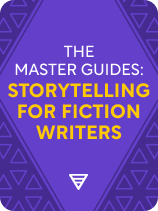

This article is an excerpt from the Shortform book guide to "The Master Guides: Storytelling for Fiction Writers" by Shortform. Shortform has the world's best summaries and analyses of books you should be reading.
Like this article? Sign up for a free trial here.
How is it possible that people can relate to a fish named Nemo? Why is Annie Wilkes (the kidnapper in Stephen King’s Misery) so terrifying?
You’re not one-dimensional, nor is anyone else. Real people are complex, and fictional characters must reflect that complexity if they’re going to be true to life and relatable. We’ve put together some insights into complex characters from Stephen King, Robert McKee, Lisa Cron, and Thomas C. Foster.
Keep reading to learn how to write complex characters that will help bring your story to life.
Editor’s note: This article is part of Shortform’s guide to storytelling. If you like what you read here, there’s plenty more to check out in the guide!
How to Write Complex Characters
Before you learn how to write complex characters, it’s important to understand something that storytelling experts agree on. One of the most vital components of any story is a relatable protagonist. The protagonist is the character whose shoes we’re stepping into. They provide us with our point of view for the rest of the story, and they’re the lens through which we interpret everything that happens.
In Wired for Story, story coach Lisa Cron asserts that the protagonist helps you, as a writer, determine what information is important and what isn’t. The audience relates to the protagonist and understands the importance of the story’s events through the protagonist’s emotions. The details in your story feel significant because of their emotional impact on the protagonist. If the audience doesn’t understand how something makes your protagonist feel, the detail will seem unimportant, and they won’t be interested in it.
How do you make your protagonist relatable? In his book Story, Robert McKee explains that, when you show the audience that your protagonist has the same universal human desires as they do, they’ll empathize with that character—that is, they’ll recognize themselves in your protagonist and feel emotionally invested in the character’s fate.
If you want the audience to relate to your protagonist, make them three-dimensional; that is, complex and multifaceted, like someone in real life. The more realistic your protagonist is, the more truth about life the audience will expect from them, making the character more compelling. As Thomas C. Foster explains in How to Read Literature Like a Professor, complex characters have backstories, strengths, weaknesses, likes, dislikes, and contradictions. Additionally, they grow and change throughout the story. (While Foster is specifically referring to fleshing out secondary characters, ensuring your protagonist has these qualities too will likely make them more relatable, too.)
Stephen King also notes that adding complexity to your characters can make them more compelling. If you portray the motivations and complexities of otherwise wooden characters, the audience will find something to identify with. In Misery, King showed how the motivations of kidnapper Annie Wilkes were perfectly reasonable to Annie herself, thereby helping the audience understand her obsession. This made her even more terrifying—instead of being a cardboard cutout monster, she could plausibly exist in the real world.
Exercise: Analyze a Character
Pick a story you’re familiar with. This might be your favorite movie, a book you’ve read, or a memorable play. Who’s the protagonist, and what’s their main goal? Do you find that character relatable? Why or why not? (For example, in Pixar’s Monsters, Inc., the protagonist is the monster Sulley, and his goal is to return the child Boo to her home. Although Sulley isn’t human, he’s relatable because he has human emotions and goals.)

———End of Preview———
Like what you just read? Read the rest of the world's best book summary and analysis of Shortform's "The Master Guides: Storytelling for Fiction Writers" at Shortform.
Here's what you'll find in our full The Master Guides: Storytelling for Fiction Writers summary:
- How to capture and communicate emotional magic through fiction
- Advice from successful authors and storytelling experts
- The five steps of writing a story, from ideating to publishing






